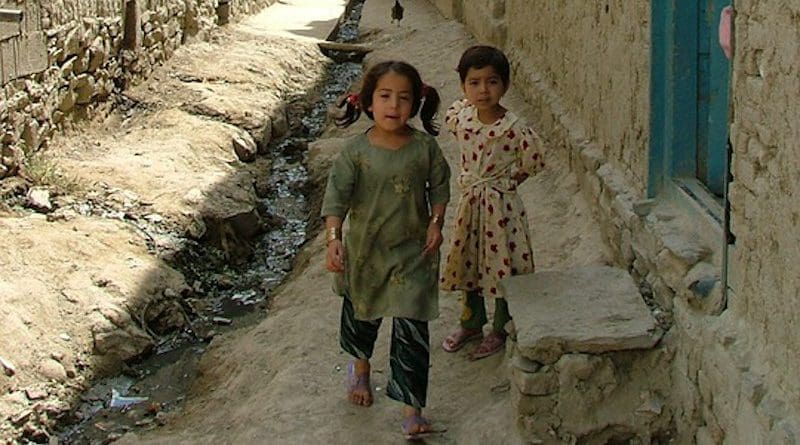Supporting Humanitarian Response In Afghanistan – OpEd
Since the withdrawal of US forces in Aug 2021, Afghanistan has been facing humanitarian, economic, health and governance crises. Afghanistan has been facing persistent humanitarian needs and governance issues due to recurring droughts, years of conflict leading to poverty, unemployment, rampant corruption and absence of security. 75 percent Afghan economy was heavily dependent on foreign aid assistance, however, this foreign assistance vanished in the wake of Taliban’s takeover leaving millions of Afghans to face the prospect of falling into poverty and starvation. Whereas there is no fund to pay the salaries of tens of thousands of people who work in public-sector jobs.
The apathy of international community especially the US after Taliban’s takeover is regrettable as it failed to play its due role to ensure economic stability of Afghanistan. The US has suspended the infrastructure projects and other forms of aid granted by the US through USAID, the World Bank, IMF and the Asian Development Bank. It has also frozen the Afghan government’s reserves of $9.5 billion held in U.S. bank accounts.
In a report, UN has warned that nearly 23 million people in Afghanistan, almost half the population, are facing acute hunger. UN Office for the Coordination of Humanitarian Affairs (OCHA) in its report about food insecurity in Afghanistan has said that a staggering 95 percent of the population is not eating enough food and further revealed a rapid increase in those experiencing acute hunger – from 14 million in July 2021 to 23 million in March 2022.
Being a neighboring country, Pakistan is playing a role of responsible and peace-loving nation to mitigate sufferings of the people of Afghanistan by making serious efforts to avert humanitarian crisis. Besides, taking relief measures at its own at government and semi-government level, Pakistan is also at the forefront to sensitize the international community to play its active part in providing timely relief and economic assistance to Afghanistan to avert humanitarian crisis.
Despite its own economic issues, Pakistan is shouldering the responsibility of one of the largest and most protracted refugee situations in the world for over four decades. Pakistan continues to host more than 3 million Afghans. Pakistan is doing all it could to facilitate Afghan refugees, however, owing to its own economic hardships, Pakistan is not in a position to accept a new influx of refugees and economic migrants. Therefore, it is equally important for international community to undertake necessary measures for the stability and sustainable socio-economic development of Afghanistan, in order to avert the possibility of any future refugee exodus from the country. The new humanitarian situations emerging around the world must not divert the global attention away from the needs of millions of Afghans.
Pakistan is also making diplomatic efforts to synergize global efforts for economic and humanitarian assistance of Afghanistan. On December 19, Pakistan hosted 17th extraordinary meeting of the Council of Foreign Ministers of Organization of Islamic Cooperation on Afghanistan, attended by over 70 delegates from member states, international aid agencies and special representatives. The establishment of a humanitarian Trust Fund, launching a Food Security Programme, besides appointing a special envoy on Afghanistan was success of the event.
Without the foreign aid, there is acute shortage of funds for supply of medicine and supplies to hospitals in Afghanistan whereas several primary-care facilities have been forced to close. Keeping in view the dilapidated condition of Afghanistan’s health sector, Pakistan Afghanistan Cooperation Forum organized free eye camps at Kabul and Khost where Pakistani doctors had performed 530 cataract surgeries and examined 8120 patients without any charge. Pakistan has also funded two hospitals namely Najib Aminullah Khan Logari hospital in Logar and Nishtar Kidney Centre in Jalalabad.
In order to facilitate Afghan trade, Pakistan eased visa for Afghan businessmen, announced tax exemption in 30 Afghan items, free movement of Afghan trucks and has also allowed air to land transport of cargo of international assistance from Pakistan to Afghanistan. Besides, Pakistan also facilitated supply of Indian assistance to Afghanistan.
Through smooth and swift visa processes, Pakistan facilitated Afghans destined for settling in third countries and for NGOs desiring to help the Afghan people. Pakistan also issued on-spot visas for the patients and Afghan students. Pakistan has also increased annual scholarships from 1,000 to 1,500 for Afghan students.
A high level pledging event on supporting the humanitarian response in Afghanistan ‘Afghanistan Conference 2022’ was held in March 2022 wherein UN launched its largest ever humanitarian appeal for a single country saying that it needs nearly US $ 5 billion in aid for Afghanistan in 2022 to prevent a humanitarian catastrophe. Around US $4.4 billion was needed within Afghanistan, while a further $623 million was required to support the millions of Afghans sheltering beyond its borders. However so far, only 13 percent of the requirements of the 2022 Humanitarian Response Plan, pledges of support could be secured.
International community needs to step up efforts for assistance of Afghanistan as the consequences of inaction will be swift and severe and difficult to reverse. In addition, international community also needs to ensure support to Afghanistan’s neighbors to share the responsibility to help them continue facilitating Afghan refugees.
Whereas easing Afghanistan’s economic crisis will ultimately require allowing Afghanistan’s Central Bank to conduct transactions using the international banking system. Therefore, US and the international financial institutions needs to validate the credentials of Afghan Central Bank to interact with international banking system and financial institutions.
The writer is an independent research analyst based in Islamabad.

